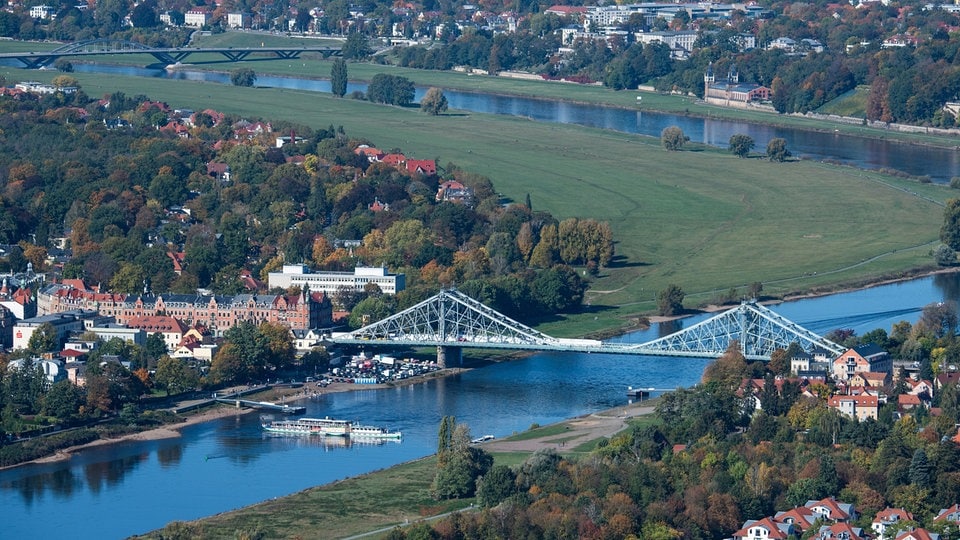Stress and holiday wishes
Linda thinks about how she experiences people: “Many people are stressed,” she says. “They tell me how important the vacation is to them and how their 36 days aren’t enough.” Linda has to laugh again. And you, how many days of vacation do you have, I ask. “22 days,” she replies immediately. She is a very balanced character.
Loschwitz is not “just” a residential area, it is also one of the Dresden districts with the highest net equivalent income, i.e. the highest net income depending on household size and composition. Like all the districts up here: Bühlau, Pappritz.
23 income millionaires in Dresden
Hardly any poor people left
Back to Loschwitz: Nowhere in Dresden is the number of social benefit recipients, with 40 reported needy people, lower than in Loschwitz, with the exception of Gompitz/Altfranken (35) on the Meißner Hochland at the other end of the city. The wealthy stay here among themselves. Rich to rich and poor to poor – is that a law?
According to sociologist Marcel Helbig from the Berlin Science Center for Social Research, the concentration of wealth and poverty is increasing, especially in East Germany. However, this is less due to the fact that there are more and more poor people (poverty has declined overall, according to his study “Behind the Facades”), but rather because lower-income people and welfare recipients are being pushed out of wealthy neighborhoods.
“The increased poverty segregation in East German cities is primarily due to the increasing proportion of neighborhoods in which hardly any poor people live anymore, and not to an increasing proportion of people in poor neighborhoods,” explains Helbig.
The increased poverty segregation in East German cities is primarily due to the increasing proportion of neighborhoods in which hardly any poor people live anymore.
Marcel Helbig Berlin Science Center for Social Research
Some Loschwitz residents cannot afford to renovate their houses
This corresponds to the comments of the florist Steffen, whom I meet at the market. “Even on the Weißer Hirsch there are people who can’t afford to renovate their houses,” he explains. Monument protection makes these enormously expensive. Quite a few would have to sell. “Having a house on the Weißer Hirsch is more of a burden,” explains Steffen.
Maybe not everyone would agree, but his arguments provide interesting insights. “You can’t finance a house on the White Hirsch with a normal salary.” The florist has expertise in home ownership; he lives in a house with his family – in Kesselsdorf.
Sample at Immoscout: A ready-to-move-in villa with 737 square meters of living space is available in Loschwitz for 2.5 million euros. But it can also be done “cheaper”: a half-timbered residential villa costs 830,000 euros without a notary, property transfer tax, etc.
Relaxed mood: “I would call it social peace”
Flower dealer Steffen Drechsel has been selling his floral splendors in Loschwitz for 22 years. He is satisfied. “The people here are all relaxed and friendly. Everyone knows each other, often for generations. I would call it social peace.”
That sounds beautiful. I let my gaze wander. People are sitting and chatting in the café opposite, and a kindly smiling lady is picking up her apples at the fruit stand. Yes, it’s incredibly relaxing. But why does social peace have to be linked to income?
Increasing separation between rich and poor
I have to think of the sociologist Helbig and the increasing separation of rich and poor. Mixing could be the solution, but it is happening less and less. It would help poorer people and prevent problems from escalating, like in Gorbitz, where crime is rising. Maybe it’s like in school: if the high-performing students don’t pull the weaker ones along, the weaker ones get attached.
A social worker once said to me that we need to think about what kind of society we want to be. I think it could be more relaxed in solidarity. Even for the wealthy. They are also under pressure. As a friend, TU employee, real estate owner said to me: “Among billionaires, even the millionaire feels poor.” For him, poverty is, beyond the social definition, wanting to have more than you have. That could happen to anyone. “Social participation is often measured in money in our societies,” he explains to me. “There are many other factors that shape personal happiness and social interaction.”
